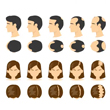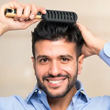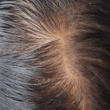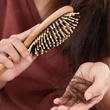Do Hair Growth Products Really Works?
Hair Growth Products: Do They Work?
Unless you have been naturally blessed with a headful of glossy and voluminous hair that has maintained its glory over time, it is safe to assume that you would have scoured the supermarket aisles for products that promise you fuller and thicker hair at one point or the other. With hair fall issues like excessive shedding, thinning, and baldness on the rise, the global hair loss treatment industry is set to grow at an unprecedented rate. You can easily find a range of shampoos, hair oils, tonics, and capsules that claim to speed up hair growth in the market today.

People have been resorting to hair growth products from ancient times to boost their hair health. While only natural, herbal remedies were available in the past, now we have more options with chemical formulations and supplements added to the hair growth product list.
Hair oil formulations that have been used since the olden days are once again gaining popularity. The range of hair growth shampoos and formulations for topical application is also steadily widening. Add to this gadgets like laser combs and scalp massagers that claim to boost hair growth. Of late, people looking to reverse hair fall are increasingly turning to vitamin supplements and medications formulated with Finasteride and Minoxidil . While a wide range of hair growth products is available in the market, the question is, do these products really work?
Are Hair Growth Products Effective?
Not all hair growth products have the same efficacy when it comes to slowing down the rate of hair fall and promoting hair growth. Both scientific studies and anecdotal evidence suggest that the success rates of different hair growth products vary from person to person though some products, in general, are more effective than others. Let us take a look at the effectiveness of some popular hair growth products based on scientific evidence.
1. Minoxidil
Minoxidil is a medication commonly prescribed by dermatologists to treat androgenetic alopecia (AGA) in both men and women. It is available in the form of a liquid solution and foam meant for topical application on dermatologists prescription . Studies on topical Minoxidils efficacy as an agent for the stimulation of scalp hair regrowth in those with AGA have shown positive results. While Minoxidil is an effective treatment for AGA, it is not yet known how effective it is in treating other forms of hair loss in men and women.
2. Finasteride
Finasteride is a prescription medication often used to treat hair loss in men. It works as an inhibitor that blocks the conversion of testosterone to dihydrotestosterone (DHT), the hormone responsible for male pattern hair loss . Scientific studies have proven finasteride to be an effective hair loss prevention treatment in males. Taking the drug in oral form can not only prevent further hair loss in most men but also has the potential to promote scalp hair growth. So, if you are a man dealing with male pattern hair loss, you might want to try finasteride. This drug, however, is not suitable for women or children.
3. Hair growth shampoos
Several shampoos promise to combat hair fall and give you thicker and healthy hair. While shampoos with ingredients like zinc, biotin, aloe vera, and saw palmetto could improve the overall quality of your hair, their efficacy as a hair growth product hasn’t been scientifically proven as yet. Volumizing shampoos can make your hair look fuller but do little to combat hair thinning or boost new growth.

4. Hair growth oils
An ancient remedy touted to promote better hair growth, hot oil massage is making a comeback into the hair care routine of the modern individual due to its perceived benefits. While using natural oils like olive oil and almond oil might make your hair shinier and easier to manage, there is limited scientific evidence to prove that these oils can indeed reverse hair loss or regrow lost hair.
5. Scalp massagers and laser combs
Scalp massagers and laser combs are products that claim to massage your scalp with gentle pressure and boost faster hair growth by stimulating hair follicles. While you may try these out to enjoy the relaxing effects of a scalp massage, keep in mind that the claims that these products help tackle hair loss are not scientifically backed.
If you are dealing with excessive hair fall and are looking for hair growth products to quickly regain your lost hair, you might be tempted to try out any option that promises quick results. However, not all hair growth products available in the market work the same. While hair growth treatments like Minoxidil and Finasteride have extensive scientific backing for certain hair loss conditions, the same can’t be said for oil massages,hair growth shampoos, laser combs, and scalp massagers. When it concerns your hair health, go for products with proven efficacy to get the best results.
Myth Busters HairFall

Androgenetic Alopecia - Everything You Need To Know
Have you been experiencing excessive hair fall over a prolonged period of time? It could be an early sign of androgenetic alopecia. It is a hair loss disorder common in both genders and can lead to progressive thinning and even baldness in some patients if not caught and treated early.

How To Make Hair Grow Faster For Men
A head full of healthy hair is a matter of confidence. Hair has its own mechanism of growing and shedding, and it is when this mechanism is thrown off that growth is hindered. Especially in the case of males, hair growth faces a lot of hiccups that can easily be managed.

Female Pattern Baldness - Causes & Treatments
Have you suddenly noticed an increase in the number of hair strands on your pillow in the morning? Or is your ponytail getting thinner by day? Well, you might be suffering from female pattern baldness. While that does sound scary, identifying it early on is key to treating this condition effectively. So keep reading to know what this is, how you can identify it, and most importantly, what treatments you can avail of to get your beautiful lustrous hair back.

What Are The Reasons For Hairfall?
Almost everyone experiences some amount of hair thinning over the years. Shedding around 50 to 100 single strands of hair per day is considered normal. However, losing more than 150 strands a day, experiencing sudden thinning, or developing circular bald patches on your scalp are reasons for concern. Hair loss occurs when new hair doesn’t grow fast enough to replace the amount of hair you lose daily. Hair can fall due to various reasons, with hereditary hair loss and poor nutrition being the most common hair fall reasons.

Expert Approved Tips For Hair Growth
What can be more debilitating than seeing hundreds of hair strands shedding from your scalp every time you brush your hair? Also, excessive molting occurs during seasonal changes that can be very stressful for you. Although it’s okay to lose between 50-100 strands every day, according to the American Academy of Dermatology, the problem occurs when you start shedding more than normal. But that doesn’t mean you have to feel helpless as there are ways to grow your hair back. Even if you are coping with baldness or alopecia, certain hair growth tips from dermatologists can come to your rescue. Read on to discover how these tips can be your savior when abnormal hair fall problems are in sight.
Trending Videos
+ 3 Sources
LMRC - GGI-CO-A2-DMA-300026127-300026127-WM-J21-282
© 2021 Dr. Reddy’s Laboratories Ltd. All rights reserved.